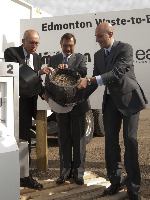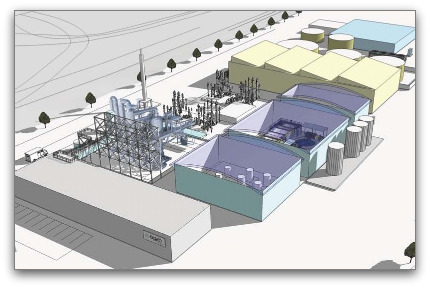
Construction starts on Alberta biofuels facility
September 1, 2010
By Enerkem
 |
 |
|
| Alberta Premier Ed Stelmach, Edmonton Mayor Stephen Mandel, and Enerkem President and CEO Vincent Chornet participate in the ground-breaking ceremony. |
Sept. 1, 2010, Edmonton – Enerkem Inc. held a
groundbreaking ceremony on August 31, 2010, to signify the start of
construction of a municipal waste-to-biofuels facility with its partners, the
City of Edmonton and the Government of Alberta. Alberta Premier Ed Stelmach,
Edmonton Mayor Stephen Mandel, and Enerkem President and CEO Vincent Chornet
participated in the event.
Enerkem’s advanced biofuels plant in Edmonton,
Alberta, will be the world’s first industrial-scale biofuels project to use
municipal solid waste as feedstock. It will have an annual production capacity
of 36 million litres (10 million gallons). Using Enerkem’s proprietary clean
technology, the CAD $80-million facility will produce enough biofuel to fuel
more than 400,000 cars/year running on a 5% ethanol blend. It will be built,
owned, and operated by Enerkem Alberta Biofuels LP (www.edmontonbiofuels.ca), a
wholly owned subsidiary of Enerkem. The City of Edmonton and Enerkem Alberta
Biofuels have signed a 25-year agreement to convert 100,000 tonnes/year of the
city’s municipal solid waste into biofuels. The garbage to be used cannot be
recycled or composted.
“This groundbreaking marks the launch of a
transformative project and leads the first wave of commercial-scale advanced
biofuels plants in North America,” says Chornet.
“As a result of this facility, we [Edmonton] will
become the first major city in North America to see 90% of its residential
waste diverted from landfill by 2013,” says Mandel.
By replacing a portion of the petroleum fuels
currently used and by avoiding the methane emissions created during waste
decomposition in landfills, Enerkem’s advanced biofuels facility will reduce
Alberta’s carbon dioxide footprint by six million tonnes over the next 25
years. The plant is scheduled to start operating towards the end of 2011.

|
|
| Three-dimensional rendering of Edmonton waste-to-biofuels facility. |
Print this page